Middle East
After Israel’s bombs, Nabatieh’s Monday Market revives itself once again | Israel attacks Lebanon

Nabatieh, Lebanon – It is a bitterly cold February morning, and Sanaa Khreiss tugs her cardigan tighter as she begins unloading her van.
The sharp bite of early spring has kept most people away from the Nabatieh souk, but not Sanaa and her husband, Youssef.
The market is quiet as the sun breaks through the grey clouds, except for a few vendors setting up.
Sanaa, who has sold at this spot for the past four years, moves with the calm precision of someone who has perfected her craft over time.
She arranges the lingerie she sells, piece by piece, carefully lining them up, each addition bringing a touch of colour and vibrancy to her stall.
The soft murmur of voices grows as more vendors arrive, helping each other set up canopies to shield their stalls from potential rain.
The task is far from easy. The wind tugs at the fabric, and some canopies still hold water from the recent rainfall. But they press on, and slowly, the white shapes pop up, and Nabatieh’s Monday Market has started.
Sanaa smiles at the occasional passer-by, her warmth never fading. She has come to know many by name and can anticipate their requests. Her voice is quiet but inviting.
“I choose the Monday Market because there’s always a lot of movement, and it’s a historic, popular spot in the south,” Sanaa tells Al Jazeera, her fingers brushing over lace and satin as she unpacks more items from the van.

In the stall next door, her husband Youssef works in silence. His movements are precise, almost meditative, but there is a hint of tension in how he arranges the containers and cookware.
Youssef has never imagined himself here; he used to be a driver for the Khiam municipality, but lost his job when the municipality ceased operations after the outbreak of the Israeli war on Lebanon in 2023, which particularly devastated Lebanon’s south, including Nabatieh, one of the region’s biggest cities.
Since then, Youssef has quietly adapted to the life of a vendor beside Sanaa.
Youssef is quiet and reserved, a stark contrast to Sanaa’s extroverted warmth. He focuses intently on his tasks, but when approached by a customer, his blue eyes shine with welcome, and his voice is friendly.
At first glance, no one would guess the weight those eyes carry – war, displacement, losing his livelihood and their home in Khiam. But at the market, it is business as usual.
The market
Shoes, toys, spices, clothing, books, food, electronics, and accessories – the Monday Market sells all that and more.
The Monday Market in Nabatieh has its roots in the late Mamluk era (1250–1517 AD) and continued to thrive under Ottoman rule. Along with the Souk of Bint Jbeil and the Khan Market in Hasbaiyya, it is one of the oldest weekly markets in south Lebanon, established as part of efforts to extend trade routes across the region.
Back then, traders moved between Palestine and Lebanon, transporting goods by mule and donkey over rough, slow roads. Nabatieh’s location made it a natural stop – a bustling centre where merchants from nearby villages would gather to buy, sell and rest before continuing their journeys. The market also sat along a wider network of internal pilgrimage routes, connecting Jerusalem to Damascus, Mecca and Najaf.

Nabatieh Mayor Khodor Kodeih recounts that merchants travelling between Palestine and Lebanon would stop at a “khan” – an inn that also served as a trading centre – on the site of the current market.
A khan typically featured a square courtyard surrounded by rooms on two levels, with open arcades. Merchants would rest, trade and display their goods there, gradually transforming the site into the bustling Monday Market.
Over time, the market has become more than just a place to buy and sell – it is a ritual that stitches together the social and economic fabric of southern Lebanon.
The area around the old khans expanded into a larger open-air souk. Israeli air strikes during the last war destroyed the original khans, but traces of the market’s past still remain. Today, the Monday Market spans three to four city blocks in central Nabatieh, surrounded by remnants of Ottoman-era architecture. While shops remain open throughout the week, the market itself is made up of temporary stalls and stands that operate only on Mondays.
Before Israel’s recent war on Lebanon, the market filled the streets, framed by Ottoman-era buildings with wooden shutters and iron balconies. Merchants packed the narrow alleys with vibrant goods, their calls for business filling the air. But on November 13, 2024, Israeli air strikes reduced the historic market to rubble. Stone arches crumbled, shopfronts burned, and what was once a bustling hub was left in ruins.

All that remains
Arriving at Sultan Square, the usual site of the old market, one is left confused. All that remains is a vast, empty space at the heart of the city.
The famous Al-Sultan sweet shop, after which the square was named, is gone. Nearby, other sweet shops – including al-Dimassi, established in 1949 and central to Nabatieh’s culinary identity and reputation – are also missing. They once sold staples of Lebanese dessert culture: baklava, nammoura, maamoul, and during Ramadan, seasonal treats like kallaj and an all-time favourite, halawet el-jibn.
Every market morning, merchants sweep the streets, using only brooms to push the debris to the sides and clear space for their stalls. Even as the wind blows rubble back towards their stand, they keep sweeping, determined to maintain a neat and orderly market.
Sanaa remembers the high-end lingerie shops that once competed with her; they’re gone too, reduced to debris amid which vendors have set up their tents as they wait for the municipality to clear the area.
There should be more vendors on that cold morning, but the rain and war have changed things.
“The good thing about rainy days,” Sanaa jokes, “is that there are fewer merchants, so customers have limited options.”
Before the war, she sold in bulk – new brides buying trousseaus, women stocking up. Now, purchases are small and careful – with homes and livelihoods lost, shopping is for necessity, not luxuries or impulse buys.
On a typical Monday, the market runs from 5am to 5pm. Merchants arrive early, making their way to their designated spots, some on the pavement, others against a backdrop of a collapsed building.
Vegetable vendors lay their produce out in large sacks and plastic crates. Normally, the market is so crowded with people that cars can’t pass and visitors have to squeeze past each other from one stall to the next.
Though profits aren’t what they used to be, Sanaa is just happy to be back. She’s kept her prices the same, hoping the market will rebound.
“This is the most important market in the south,” she says. “And we need to follow the source of our livelihood.”

‘Deep love story with the Monday market’
Next to Sanaa’s stall is Jihad Abdallah’s, where he has rigged up several racks to hang his collection of women’s sports clothes.
Yesterday’s snow is melting as the sun comes out, but Jihad keeps his hoodie up, still feeling the lingering cold.
Customers have started trickling over, but it isn’t enough to shake the frustrated, tired look on his face.
Jihad, from the border village of Bint Jbeil, spends his week travelling between different town markets in southern Lebanon to make ends meet.
He was among the first to set up in Bint Jbeil’s Thursday Market as soon as the ceasefire with Israel was announced on November 27, 2024. Jihad didn’t have many options. Bint Jbeil was the market he knew best – he memorised the rhythms, understood customer demands, and recognised how to turn profit. Still, business was slow.
“In Bint Jbeil, the market needs time to recover because many residents from nearby villages, like Blida, Aitaroun and Maroun al-Ras, haven’t returned yet,” Abdallah tells Al Jazeera.
“However, in Nabatieh, nearby towns have seen more returnees.”
Jihad was also among the first to return to the Nabatieh market, joining the very first band of merchants in clearing as much debris as they could manage.
“The Israelis want to make this land unliveable, but we’re here. We’re staying,” Jihad says. “They destroyed everything out of spite, but they can’t take our will.”
Further down the road, Abbas Sbeity has set up his stand of clothes for the day, a collection of children’s winter clothes he couldn’t sell because of the war.
“I had to empty my van to make room for mattresses for my kids to sleep on when we first escaped Qaaqaait al-Jisr [a village near Nabatieh],” he tells Al Jazeera, pointing to the van behind him, now packed with clothes.
Abbas is trying to make a profit, however small, from clothes that were meant to be sold when children returned to school last fall.
He’s been coming to the Monday Market for 30 years, a job passed down from his father, who inherited it from his grandfather.
“My grandfather used to bring me here on a mule!” he says with a nostalgic smile. For a moment, he stares off, lost in thought. His smile stays, but his voice holds a trace of sadness.
“There’s a deep love story with the Monday Market,” he adds. “But now, there’s a sadness in the air. People’s spirits are still heavy, and the destruction around us really affects their morale.”
Abbas remembers how people came not only to buy but to hang out for a weekly outing they could count on for fun, no matter the weather. Even if they didn’t buy anything, they’d enjoy the crowds or grab a bite, whether from the small shops selling manouches, shawarma, kaak or falafel sandwiches, or from a restaurant nearby, from local favourites like Al-Bohsasa to Western chains.
Many would also stop by Al-Sultan and Al-Dimassi, which were the closest to the market, to enjoy a sweet treat, a perfect way to top off their visit.
By noon, the rain had stopped, leaving behind a gloomy day as the sun struggled to break through the clouds, casting a faint light over the market. People haggled over prices, searched for specific sizes, and despite the changes brought by war, the Monday Market pressed on, determined to hold on to its place.

‘We won’t let them,’ determination versus reality
At one end of the Sultan Square, near the upper right corner, a half-destroyed building still stands where vendors used to set up shop before the war. Now, produce vendors arrange their stalls beneath it as if nothing had changed. The remnants of the structure loom above them – fragments of walls hanging precariously, held together by stray wires that look ready to snap.
Yet the vendors paid no mind, too absorbed in tending to customers. The building’s arched openings and ornate details, though battered, still hinted at the city’s rich past. Its verandas, standing like silent witnesses to the souk below, bore testament to both the scars of war and a culture that refused to disappear.
At the far end of the market, by the main road leading out of Nabatieh to nearby villages, one cart stands alone, piled high with nuts and dried fruits. Its owner adds more, making the stacks look like they might spill over at any second.
Roasted corn, chickpeas, and almonds sit next to raw almonds, hazelnuts, cashews and walnuts. Dried fruits are displayed front and centre, dates and apricots taking the spotlight.
At the back of the cart, Rachid Dennawi arranges candies – gummy bears and marshmallows in all shapes and flavours. It’s his first day back at the Monday Market since the war began.
Abir Badran, a customer dressed in a dark cardigan and a long black scarf that gently frames her face, is the first to reach Rachid’s cart while he’s still setting up. Her face lights up as she leans in to examine the dates, carefully picking through them.
“Finally, you’re back!” she says, reaching for the dates – they’re bigger and better than what she can find at other places, she says.

Rachid, originally from Tripoli in Lebanon’s north, makes the three-hour journey to Nabatieh because he believes the market is livelier, has more customers.
Over time, Rachid has built a loyal clientele, and people like Abir swear by his dried fruit and nut mix.
“The people here are different,” he tells Al Jazeera, handing Abir a handful of almonds to taste. “They don’t just buy from you – they welcome you and want you to succeed.”
But Abir didn’t just come to stock up – she is there because the Monday Market has become an act of resistance.
“The Israelis want to sever our ties to this land,” Abir tells Al Jazeera. “But we won’t let them.”
While the optimism is clear, the reality on the ground is tough.
Merchants and residents are doing what they can with what they have. Some have relocated their shops or started new businesses, but some are stuck in limbo.
Mayor Kodeih estimates it will take at least two years to rebuild the market and is critical of the Lebanese government’s support.
“We will restore the market,” he says. “It won’t be the same, but we’ll bring it back.”
The mayor was injured in the Israeli strike on the municipality in mid-October, which killed 16 people; he is one of the two survivors.
It is not easy to leave the market behind – or Nabatieh.
Despite the destruction, the city hums with life: Shops are open, cafes are busy, and people lean in doorways, greeting passers-by with warm smiles and easy conversation.
The gravity of war has left its mark. The destruction is visible at every turn – a bookshop reduced to rubble, shops flattened to the ground – but it has not stripped away the city’s kindness or its sense of humour.
In front of a lot with nothing more than a gaping hole in it, a playful banner by the shop that used to stand there reads: “We’ll be back soon … we’re just redecorating.”
One of the paths out of the Sultan Square leads visitors northeast, into a quieter neighbourhood of cobbled streets, where cafes and small shops line the way. Here, people sip coffee and linger by storefronts, seemingly untouched by the devastation only steps away.
Turning back at the boundary between the two, the destruction that has decimated the market is more apparent, as is the loss to Nabatieh and southern Lebanon.
The market’s heyday will live on only in the memories of those who experienced it, younger generations will never have that same experience.

Middle East
At least 33 people killed in suspected RSF attacks in Sudan | Sudan war News
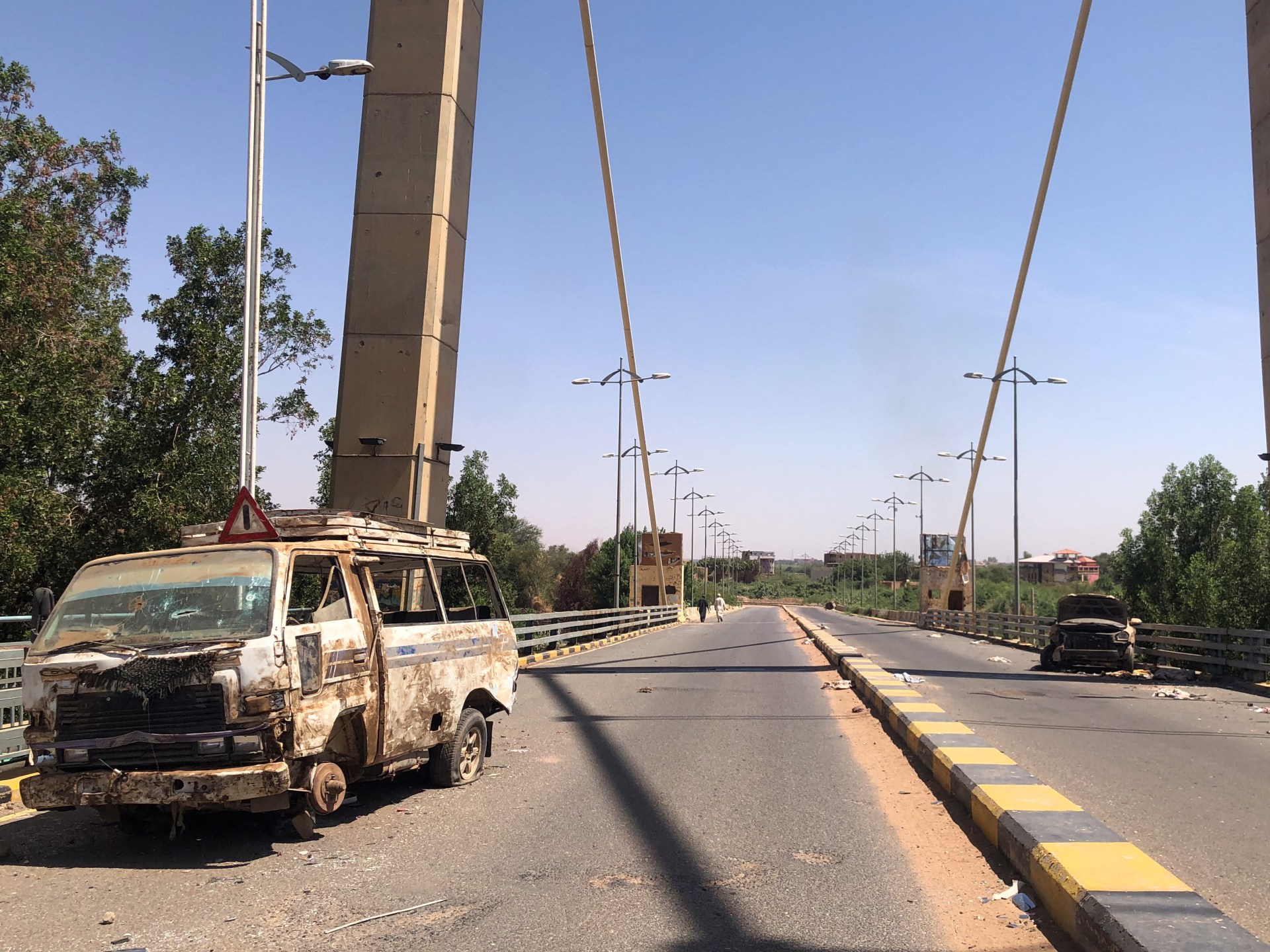
The paramilitary force has been blamed for attacks on a prison in el-Obeid and a displacement camp in Darfur.
At least 33 people have been killed in Sudan in attacks suspected to have been carried out by the paramilitary Rapid Support Forces (RSF) as the brutal two-year war claims its latest victims.
An RSF strike on a prison on Saturday in el-Obeid killed at least 19 people, while on Friday evening, at least 14 members of the same family were killed in an air attack in Darfur, local sources said.
The attacks – part of the RSF’s ongoing war with the military-led government’s Sudanese Armed Forces (SAF) since 2023 – came after six straight days of the paramilitary group’s drone attacks on the army-led government’s wartime capital of Port Sudan.
These attacks damaged key infrastructure, including a power grid and the country’s last operational civilian airport, which was a key gateway for aid into the war-ravaged nation.
The war has left tens of thousands dead, displaced 13 million people and triggered what the United Nations calls the world’s worst humanitarian crisis.
The attack on the prison on Saturday also wounded 45 people, a medical source told the AFP news agency. The source said the jail in the army-controlled city in the North Kordofan state capital was hit by an RSF drone.
The night before, 14 people were killed at the Abu Shouk displacement camp near el-Fasher in Darfur, a rescue group said, blaming the paramilitary.
The camp “was the target of intense bombardment by the Rapid Support Forces on Friday evening”, said the group of volunteer aid workers.
The camp near el-Fasher, the last state capital in Darfur still out of the RSF’s control, is plagued by famine, according to the UN.
It is home to tens of thousands of people who fled the violence of successive conflicts in Darfur and the conflict that has been ripping Africa’s third-largest country asunder since 2023.
The RSF has shelled the camp several times in recent weeks.
Abu Shouk is located near the Zamzam camp, which the RSF seized in April after a devastating offensive that virtually emptied it.
RSF escalation
Elsewhere on Saturday, SAF warplanes struck RSF positions in the Darfur cities of Nyala and el-Geneina, destroying arms depots and military equipment, a military source told AFP.
The RSF has recently said it had taken the strategic town of al-Nahud in West Kordofan, a key army supply line to Darfur.
The RSF’s escalation in Port Sudan earlier this month came after the military struck the Nyala airport in South Darfur, where the RSF receives foreign military assistance, including drones. Local media stated that dozens of RSF officers were killed in the attack.
Sudan’s army-aligned authorities accuse the United Arab Emirates of supplying those drones to the RSF, which has no air force of its own.
The war began as a power struggle between SAF chief Abdel Fattah al-Burhan and his former deputy, RSF commander Mohamed Hamdan Dagalo. It has effectively divided the country into two, with the army controlling the north, east and centre, while the RSF and its allies dominate nearly all of Darfur in the west and parts of the south.
Both sides have been accused of committing war crimes.
Middle East
Iran’s FM visits Saudi Arabia, Qatar before nuclear talks with US in Oman | Politics News

The Iranian Ministry of Foreign Affairs has confirmed there will be a technical delegation at the Iran-US talks in Oman on Sunday.
Iran’s Foreign Minister Abbas Araghchi has visited Saudi Arabia and is due to visit Qatar for consultations in the run-up to the fourth round of indirect nuclear talks with the United States, which will take place in Oman on Sunday.
The future direction of Iran’s nuclear programme, its enrichment of uranium, and sanctions relief remain the key issues.
Araqhchi’s Gulf tour on Saturday comes after Tehran confirmed the latest round Friday: “The negotiations are moving forward, and naturally, the further we go, the more consultations and reviews are needed,” Araghchi said in remarks carried by Iranian state media.
Omani Foreign Minister Sayyid Badr Albusaidi said on Friday that, after “coordination with both Iran and the US”, the delayed talks would go ahead in Muscat. The fourth round, initially scheduled for May 3 in Rome, was postponed for what Oman described as “logistical reasons.”
A source familiar with the matter said on Friday that US President Donald Trump’s special envoy, Steve Witkoff, plans to attend the meeting in Oman.
Ongoing dispute over nuclear programme
The talks come against the backdrop of a long-running dispute over Iran’s nuclear ambitions. The meeting is the latest effort to revive diplomacy after years of rising tensions.
Successive US administrations have sought to prevent Iran from acquiring a nuclear weapon. A sustained effort by world powers during the Barack Obama administration culminated with a 2015 agreement called the Joint Comprehensive Plan of Action (JCPOA).
The multilateral agreement created a framework for Iran to receive much-needed relief from international sanctions, in exchange for reducing its uranium enrichment and submitting to inspections of its nuclear facilities.
But when Trump succeeded Obama as US president, he unilaterally withdrew the US from the nuclear agreement in 2018, causing the deal to crumble.
Some Western countries argue that Iran’s programme, accelerated after the US walkout from the 2015 accord, is aimed at developing weapons. Tehran maintains that its nuclear activity is entirely civilian.
Trump himself has acknowledged tensions in his policy on Iran, saying at the start of his second term that hawkish advisors were pushing him to step up pressure reluctantly.
In an interview on Thursday, Trump said he wanted “total verification” that Iran’s contested nuclear work is shut down, but through diplomacy.
“I’d much rather make a deal” than see military action, Trump told the conservative radio talk show host Hugh Hewitt.
“There are only two alternatives – blow ’em up nicely or blow ’em up viciously,” Trump said.
In an interview with Breitbart News on Friday, Witkoff said the US would “take [Iran] at their word” that they do not want nuclear weapons, but set out specific conditions for verifying such a position.
“If that’s how they feel, then their enrichment facilities have to be dismantled. They cannot have centrifuges. They have to downblend all of their fuel that they have there and send it to a faraway place — and they have to convert to a civil programme if they want to run a civil programme,” he said.
US Secretary of State Marco Rubio earlier raised the possibility of Iran importing enriched uranium for any civilian energy.
Iran’s Gulf outreach
Araqchi’s trips to Saudi Arabia and Qatar on Saturday are part of what he describes as “continuous consultations” with neighbouring states.
He said the visits aimed to address “concerns and mutual interests” regarding the nuclear issue.
Iranian Foreign Ministry spokesperson Esmail Baghaei confirmed the presence of a technical delegation in the talks in Oman on Saturday.
In an interview with Mehr News, Baghaei stated that the Iranian delegation is comprised of experts and specialists relevant to the current phase of the negotiations. He did not comment on the US team.
Middle East
My nephew asks if he will eat meat only in heaven. I struggle to answer | Israel-Palestine conflict
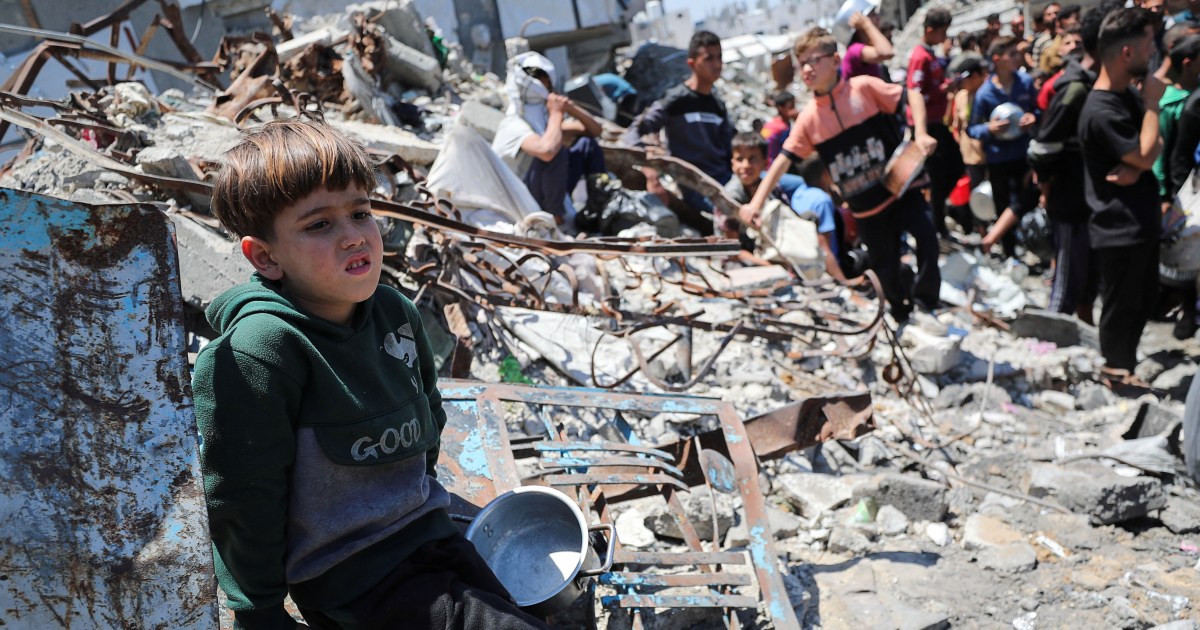
When on March 2, we heard all crossings into Gaza were closed, we thought it would not last more than two weeks. We really wanted a normal Ramadan where we could invite our surviving relatives for iftar and not worry about what food we could find to break our fast.
But it did not turn out this way. We spent the holy month breaking our fast with canned food.
My family, like most families in Gaza, had not stocked up on food or essentials, as no one expected the crossings to close again, or the famine – or even the war – to return.
In the days after the closure, food and other basic goods disappeared from the markets, and prices skyrocketed. A kilogramme of any vegetable jumped to $8 or more, sugar $22 and baby formula $11. A sack of flour previously costing $8, went up to $50; within two months, it reached $300.
Most people in Gaza could not afford these prices. As a result, families, including my own, began reducing the number of meals they eat, limiting themselves to just breakfast and dinner, and shrinking each person’s portion – half a loaf of bread for breakfast a whole one for dinner. Men, women, elderly people and children would stand in front of bakeries and charity kitchens for hours, in shame and sorrow, just to get a few loaves of bread or a small plate of food. For some families, this would be their only food for the day.
All the residents of central Gaza, where I live, relied on only three bakeries: two in Nuseirat and one in Deir el-Balah.
The crowds at these bakeries were overwhelming, blocking roads and halting movement in the area. Every day, there were cases of fainting and suffocation due to the pushing and shoving. In the end, only a small number of those who waited since morning would get bread.
My father would go to the bakery before sunrise to line up, instead of using what’s left of our flour, because we did not know how long this situation would last. But he would find the line already long, dozens having slept outside the bakery. He would stay until noon, then send my brother to take his place in the line. In the end, they would return with nothing.
On March 31, the World Food Programme announced the closure of all of its bakeries, including the three we could access, due to the depletion of flour and the lack of gas needed to run the ovens. This marked the start of true famine.
Soon, charity kitchens started closing as well because they ran out of food stock. Dozens of them shuttered in the past week alone. People grew even more desperate, many taking to local groups on Facebook or Telegram to beg for anyone to sell them a bag of flour at a reasonable price.
We live in a “lucky” neighbourhood where the kitchen still functions.
My niece Dana, who is eight years old, lines up in front of it every day with her friends, waiting for her turn as if it were a game. If she receives a single scoop of food, she comes back running, feeling very proud of herself. And if her turn doesn’t come before the food runs out, she returns in tears, complaining about how unfair this world is.
One day during Ramadan, a boy, displaced with his family to the al-Mufti School near our home, was so desperately trying to get food that he fell into the pot of hot food the charity kitchen was cooking. He suffered severe burns and later died from them.
The signs of famine began becoming apparent everywhere about a month and a half after the closure of the crossings. We see them in every aspect of our lives – sleeping on an empty stomach, rapid weight loss within, pale faces, weak bodies. Climbing stairs now takes us twice the effort.
It has become easier to get sick and more difficult to recover. My nephews, 18-month-old Musab and two-year-old Mohammed, developed high fever and flu-like symptoms during Ramadan. It took them a whole month to get better because of the lack of food and medicine.
My mother has been suffering from severe vision loss due to complications after eye surgery she had in late February. The malnutrition and the lack of eye drops she needed to recover have made her condition much worse.
I myself have been unwell. I donated blood to al-Awda Hospital in Nuseirat just days before the border was closed and this seriously affected my physical health. Now, I suffer from extreme weakness in my body, weight loss and difficulty focusing. When I went to the doctor, he told me to stop eating canned food and to eat more fruit and meat. He knew that what he was saying was impossible to do, but what else could he say?
Perhaps the most difficult part about this situation is having to explain famine to little children. My nieces and nephews cannot stop asking for things to eat that we simply cannot provide. We struggle to convince them that we are not punishing them by hiding food, but that we simply do not have it.
Five-year-old Khaled keeps asking for meat every day while looking at food pictures on his mother’s phone. He stares at the images and asks whether his martyred father gets to eat all this in heaven. Then he asks when his own turn will come, to join his father and eat with him.
We struggle to answer. We tell him to be patient and that his patience will be rewarded.
I feel helpless seeing daily scenes of famine and desperation. I ask myself, how can the world stay silent while seeing children’s bodies go thin and fragile and the sick and injured die slowly?
The occupation uses every method to kill us – by bombing, starvation, or disease. We have been reduced to begging for a piece of bread. The entire world watches and pretends that it cannot even give us that.
The views expressed in this article are the author’s own and do not necessarily reflect Al Jazeera’s editorial stance.
-
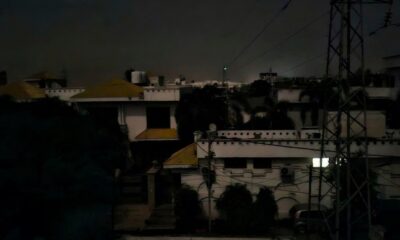
 Conflict Zones2 days ago
Conflict Zones2 days ago‘Missiles in skies’: Panic in Indian frontier cities as war clouds gather | India-Pakistan Tensions News
-
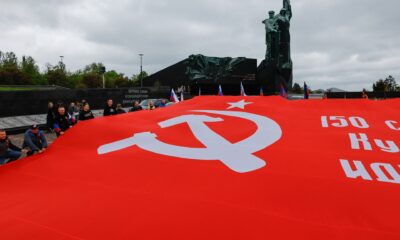
 Conflict Zones2 days ago
Conflict Zones2 days agoRussia-Ukraine war: List of key events, day 1,170 | Russia-Ukraine war News
-

 Europe2 days ago
Europe2 days ago‘Father of haute couture’: The man who pioneered fashion as we know it
-

 Europe1 day ago
Europe1 day agoUkraine’s Western allies pile pressure on Putin, threatening sanctions if he refuses 30-day truce
-

 Europe1 day ago
Europe1 day agoPope Leo XIV urges cardinals to make themselves ‘small’ in first mass as pontiff
-
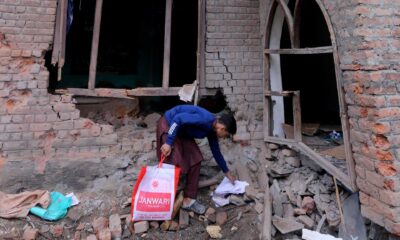
 Conflict Zones1 day ago
Conflict Zones1 day ago‘Slippery slope’: How will Pakistan strike India as tensions soar? | India-Pakistan Tensions News
-

 Lifestyle1 day ago
Lifestyle1 day agoKids author Mo Willems and The Pigeon stare down the future in a new book
-
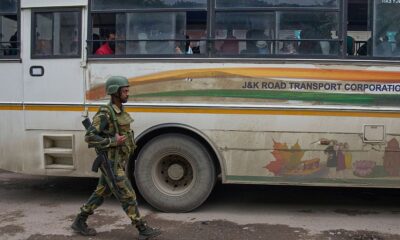
 Africa1 day ago
Africa1 day agoHeavy shelling over Kashmir Line of Control leaves at least 5 civilians dead




